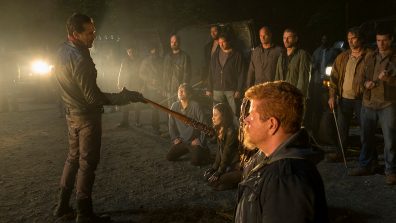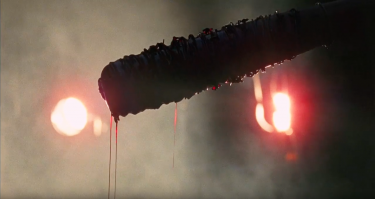Let’s face it: horror media has lost its mojo. The reasons for this are myriad, but a major factor is that, in a time when the US government includes zombie attack drills in its disaster preparedness briefings and academic dissertations are published about the films of George Romero, the genre can no longer be said to retain the subversive edge that I’d argue is vital to its survival. This past week, however, offered a ray of hope.
 I’m referring here to an already-infamous article that was published in the Detroit Free Press on October 31, 2016, about a “horrific episode” of THE WALKING DEAD. I’ve always thought being “horrific” was the whole point of the show, but author Rochelle Riley apparently feels otherwise, claiming the brutality of a scene in which the character of Nagin (Jeffrey Dean Morgan) beats in the heads of two of the show’s principals with a barbed-wire wrapped bat “shouldn’t be allowed. Even for money,” and demands the program “be penalized in some way” (read: censored) by the government, “before our need to be unfettered forces us to lose our souls.” Furthermore, this episode, which apparently “went farther than perhaps any show in history” (doubtful), premiered during a time period “when any 9 year old could be passing by the TV.”
I’m referring here to an already-infamous article that was published in the Detroit Free Press on October 31, 2016, about a “horrific episode” of THE WALKING DEAD. I’ve always thought being “horrific” was the whole point of the show, but author Rochelle Riley apparently feels otherwise, claiming the brutality of a scene in which the character of Nagin (Jeffrey Dean Morgan) beats in the heads of two of the show’s principals with a barbed-wire wrapped bat “shouldn’t be allowed. Even for money,” and demands the program “be penalized in some way” (read: censored) by the government, “before our need to be unfettered forces us to lose our souls.” Furthermore, this episode, which apparently “went farther than perhaps any show in history” (doubtful), premiered during a time period “when any 9 year old could be passing by the TV.”
This article, for starters, can be accurately dismissed as a product of new-school political correctness, which decrees that anything the slightest bit offensive be permanently banished from sight (with university campuses now regularly banning the use of words like “crazy,” “freshman” and “you guys”). Note how, in her suggestion that “school thugs and shooters and monsters” might “get their ideas” from imagery like that contained in the WALKING DEAD scene under contention, the author doesn’t even bother with the standard “many studies show that…” qualifier, nor the equally standard “must have” arguments (which are used when no evidence exists to back up an accuser’s claim, as in “the Columbine shooters must have seen THE MATRIX before embarking on their rampage”), the inference being that, simply, Rochelle Riley was upset by the episode so therefore it MUST be censored.
The article’s most striking element in my view is the buzz-worthy phrase “We have freedom-of-speeched ourselves to death.” This joins classic pro-censorship quotes like “Freedom of speech isn’t actually free,” “There are some sensitive subjects that are not appropriate for people,” “They were wrong then (about past censorship decisions) but they’re right now” and—my personal favorite—“This isn’t a censorship decision, it’s a citizenship decision” (because apparently you’re not actually advocating censorship so long as you call it something else).
We can trace such arguments back to 1960, the publication date of Pat Boone’s bestselling teen advice book BETWEEN YOU, ME AND THE GATEPOST. It’s that book in which Boone, in a discussion about the evils of horror movies (with I WAS A TEENAGE WEREWOLF strongly alluded to), warned his readers to “Be careful about what kinds of movies you see…if you don’t, you’re gonna get morally and spiritually sick!” Boone’s appeal to the spiritual directly anticipates Rochelle Riley’s losing-our-souls warning. Likewise, Riley’s questionable claim about the despised WALKING DEAD episode being more extreme than “any show in history” was foreshadowed by a Daily Mail reviewer’s equally questionable assertion that THE EXORCIST was “the most shocking, sick-making and soul-destroying work ever to emerge from filmland.” Such hyperbole is typical of pro-censorship advocates, who always insist on overstating their case.
Oh, and that hypothetical nine year old who might pass by the TV when THE WALKING DEAD is on, the mere possibility of which is supposed to inspire the rest of us to permanently alter our viewing habits? There exist more duplicates of that argument than I can count, as evinced by the many repressive laws that over the decades have passed under the “protect the children” banner.
As you might have gathered, I’m passionately opposed to censorship. It’s my belief that the pro-censorship arguments outlined above came  about out of ignorance and/or short-sightedness. As comic book author Neil Gaiman perceptively argued in a 2000 Gauntlet magazine interview, “Too many Americans take (freedom of speech) for granted. Because you’ve got it”—a privilege, Gaiman claims, too many of us are willing to sacrifice, the attitude being “‘Yeah, free speech is great for the right kind of speech or the speech I approve of.’” Gaiman further notes that the two biggest supporters of the Comic Book Legal Defense Fund, a renowned anti-censorship organization, are himself, a Brit, and the Canadian Dave Sim, because unlike most Americans, “we both know what the alternative is.”
about out of ignorance and/or short-sightedness. As comic book author Neil Gaiman perceptively argued in a 2000 Gauntlet magazine interview, “Too many Americans take (freedom of speech) for granted. Because you’ve got it”—a privilege, Gaiman claims, too many of us are willing to sacrifice, the attitude being “‘Yeah, free speech is great for the right kind of speech or the speech I approve of.’” Gaiman further notes that the two biggest supporters of the Comic Book Legal Defense Fund, a renowned anti-censorship organization, are himself, a Brit, and the Canadian Dave Sim, because unlike most Americans, “we both know what the alternative is.”
That said, I do recognize that the self-righteous ranting of Rochelle Riley and co. can have positive effects. Pro-censorship screeds, after all, invariably function as an unbeatable advertisement for the book/movie/TV program being attacked. With that in mind here’s a final quote, emerging from Roger Ebert’s infamously venomous 1980 review of CALIGULA, in which he despairingly admits the film is “invulnerable to a review like this one. There are no doubt people who believe that if this movie is as bad as I say it is, it must be worth seeing.” He was correct, as I was indeed quite anxious to see CALIGULA after reading Ebert’s admonitions—just as Ms. Riley’s rant about THE WALKING DEAD, a program I’ve never had much interest in (I contend that zombie media peaked in the 1990s, and based on what I’ve seen of THE WALKING DEAD it doesn’t offer much in the way of novelty), is actually inspiring me to reconsider my feelings about it. That’s something the rave reviews the show has accumulated never managed to accomplish.
For that matter, I’m finding myself reassessing my feelings about the overall state of the genre, which by its very nature is supposed to piss off the Rochelle Rileys and Pat Boones of the world. If a single episode of a horrific TV program can make such an impression—and do so in the midst of so much real-life horror—then the genre is clearly in much better shape than I previously believed. Horror media may be down, but it’s definitely not out.
